-
Countries
-
Data and Analysis
-
Special Focus
-
Crisis Responses
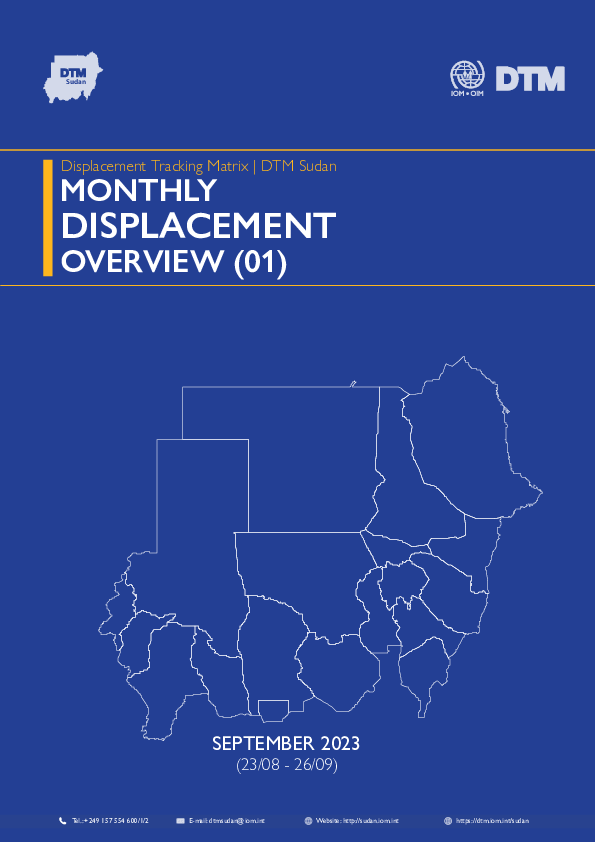
Contact
DTM Sudan, DTMSudan@iom.int
Language
English
Location
Sudan
Snapshot Date
Sep 26 2023
Activity
- Mobility Tracking
- Baseline Assessment
Overview
IOM DTM Sudan is pleased to present its first Monthly Displacement Overview. This publication provides an account of Sudan’s displacement context since 15 April 2023 – outlining population caseloads and movements, as well the present and evolving needs of Sudan’s growing IDP caseload.
Rationale
Recognizing the need for more detailed insights into the IDP situation, including the priority needs, access to services, movement intentions, and demographic breakdowns of the affected population, DTM Sudan has undertaken a comprehensive review of our data collection tool. In collaboration with a wide range of internal and external stakeholders, we have developed a new tool to better inform humanitarian response operations, aligning with the DTM global methodology. Leveraging our extensive network of approximately 300 field-based enumerators and a robust system of over 1500 key informants across the country, DTM has gathered data on IDPs across 4,080 locations, in 167 of Sudan’s 189 localities – across all of Sudan’s 18 states.
Key Findings
- DTM Sudan estimates that 4,295,092 Individuals (856,578 Households) have been recently internally displaced.
- IOM DTM also reports that an estimated 1,190,633 mixed cross-border movements have been made into neighbouring countries.
- During the previous month, field teams have reported heavy clashes between RSF and SAF forces in the capital, as well as the state capitals of South Darfur and North Darfur. Additionally, inter-communal conflicts have been observed across West Darfur.
- Since 15 April 2023, 45% of the IDP caseload has sought refuge in the Darfur and Kordofan regions, whereas the majority (55%) are observed across the Northern, Eastern, and Central states.
- Just over two-thirds of the IDP caseload are seeking shelter with the host community.
- While Food Security remains the highest priority need, Health and Non-Food Items are also growing concerns.
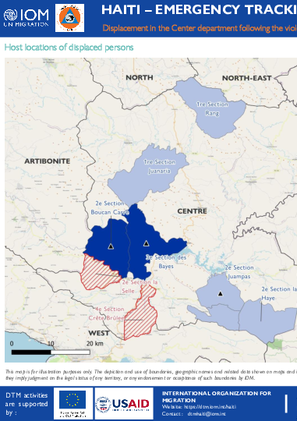
Contact
dtmhaiti@iom.int
Language
English
Location
Haiti
Period Covered
Sep 22 2023
Sep 25 2023
Activity
- Mobility Tracking
- Event Tracking
The emergency monitoring aims to gather information about significant and sudden population movements, as well as security and climate emergency situations. The information is collected through interviews with key informants and direct observation.
This information was collected following the armed attacks that occurred on September 22, 2023, in Saut D'Eau, in the 2nd communal section of La Selle, and on September 25, 2023, in Mirebalais, in the 4th communal section of Crête Brûlée, in the Center department. These attacks have affected the residents of several municipalities and have led to the creation of eight new sites. Assessments were conducted with key informants over the phone. The results indicate that 10,026 people are internally displaced persons, distributed among 3,135 households. Among them, 915 people are living in sites, corresponding to 252 households.
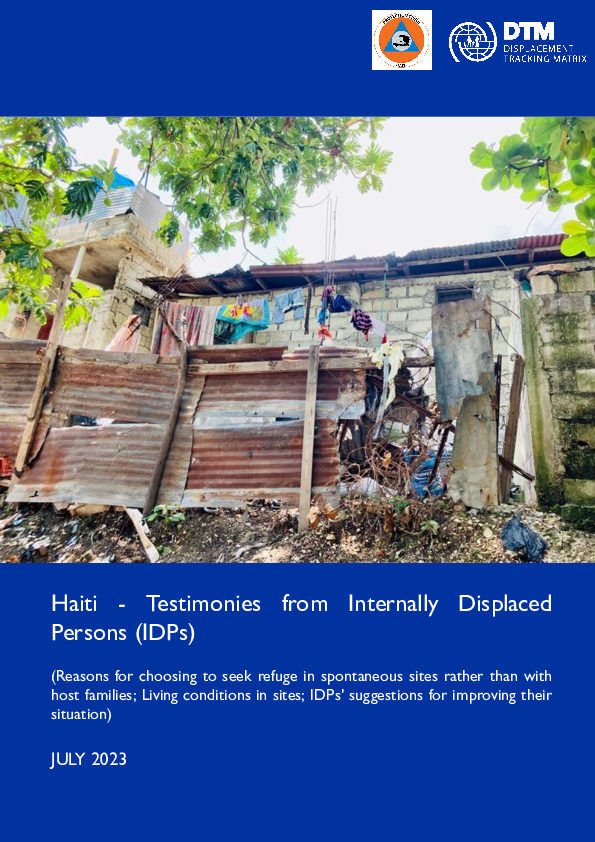
Contact
dtmhaiti@iom.int
Language
English
Location
Haiti
Period Covered
Jul 21 2023
Jul 25 2023
Activity
- Survey
- Mobility Tracking
- Site Assessment
- Baseline Assessment
This report constitutes a complementary analysis to the quantitative reports already published by DTM as part of the fourth phase of site and neighborhood assessments in the MAPAP: Information sheet on the displacement situation in the West Department, Detailed mapping of the displacement situation in the MAPAP.
The quantitative results from Round 4 have demonstrated a trend of IDPs leaving host families to settle in sites. While the total number of IDPs in the MAPAP has not significantly increased since the end of 2022 (see Map 1 and Graph 1 below), their places of accommodation have varied significantly (Graph 2). By the end of 2022, only 25 percent of IDPs were settled in sites, whereas by June 2023, this percentage had risen to 45 percent, with nearly half of the IDPs now settled in sites (Graph 2). Given that the number of IDPs has not increased significantly, these results indicate that the same IDPs previously hosted by families are moving to settle in sites where living conditions are extremely precarious, and people are exposed to higher protection risks.
This report aims to deepen the understanding of this trend through testimonies from IDPs obtained through open interviews.
Sep 27 2023
Print
Classification
International Consultant to support the development of an Environmental/Climate Migration Survey in Pakistan
Duty Station
Home-based (IOM Pakistan)
Number of positions
1
Starting Date
October 1 2023
Type
Closing Date
2023-10-09
Status
Open
Duration
4months
PROJECT AND SCOPE OF WORK
Established in 1951, IOM is the leading inter-governmental organization in the field of migration and works closely with governmental, intergovernmental and non-governmental partners. IOM is dedicated to promoting humane and orderly migration for the benefit of all. It does so by providing services and advice to governments and migrants.
The Displacement Tracking Matrix (DTM) Regional Evidence for Migration Analysis and Policy (REMAP) project was developed in response to the critical need to collect and analyze information on (protracted) displacement and human mobility in, to and from Afghanistan, Bangladesh, Kazakhstan, Kyrgyzstan, Pakistan, Tajikistan and Uzbekistan and to contribute to evidence-based humanitarian and development programming in these countries and in the region.
With the growing recognition of the complex, non-linear interplay between climate change and human mobility, IOM aims to initiate a DTM survey focused on understanding the linkages between environmental degradation/climate change and human mobility in Pakistan. This survey seeks to investigate both internal mobility within Pakistan's borders and international migration patterns of Pakistani and non-Pakistani nationals.
The primary objective of this consultancy is to design a robust methodology, including a detailed sampling plan, household survey instrument, and an overall implementation plan for the DTM environmental/climate change and human mobility survey. The consultant will play a pivotal role in shaping the framework that will guide the collection, analysis, sampling, and interpretation of data on how climate change impacts human mobility in Pakistan.
Organizational Unit / Team to which the Consultant is contributing:
The consultant will directly contribute to the DTM programme in Pakistan including DTM REMAP’s project output 1.1: Strengthened and comprehensive longitudinal disaggregated data and information management mechanism on displacement, migration, and return in Pakistan.
Under overall supervision of the DTM Programme Manager in Islamabad, Pakistan and in close coordination with the Senior Regional Project Manager (DTM REMAP) in GDI, Berlin Germany and the Senior Programme Coordinator (HRRD) in Islamabad Pakistan and the DTM Pakistan team, the consultant is responsible for developing i) Methodology Design, ii) Household Survey, iii) Implementation plan.
CATEGORY B CONSULTANTS: TASKS TO BE PERFORMED UNDER THIS CONTRACT
The consultant will undertake the following tasks:
- Methodology Design:
- Conduct a comprehensive literature review on existing research related to climate change/environmental degradation and human mobility in the context of Pakistan.
- Develop a methodological framework that outlines the overall survey design, detailed sampling strategy, data collection methods (focusing on quantitative approaches), and analytical techniques used for analysis.
- Conduct a comparative analysis and research area selection methodology of sampling areas experiencing different impacts related to environmental degradation/climate change and a detailed guideline to sample households within the selected research areas.
- Design a conceptual model that visually represents the various factors, drivers, and interactions between climate change, environmental stressors, and different forms of human mobility (internal and international).
- Household Survey Instrument:
- Design a comprehensive, longitudinal household survey instrument that captures socio-demographic information, climate-related vulnerabilities, migration histories, decision-making processes related to mobility, and perceptions of climate change impacts.
- Collaborate with local experts and stakeholders to ensure the survey instrument is culturally sensitive and contextually appropriate for Pakistan.
- Incorporate survey questions to collect quantitative data (e.g., statistical indicators) from surveyed households that explain longer-term mobility decision-making.
- Implementation Plan:
- Develop Standard Operating Procedures (SOPs) related to the selection of households and data collection efforts.
- Develop a detailed plan for the implementation of the survey, outlining timelines, roles and responsibilities, logistical considerations, and ethical guidelines.
- Propose strategies for maximizing participation and minimizing potential risks during data collection, including data privacy and security measures.
- Identify potential challenges and recommend mitigation strategies to ensure the survey’s success.
The consultant will be responsible for delivering the following:
- Methodology Document: A comprehensive document outlining the survey methodology, including the conceptual model, sampling strategy, data collection methods, and analytical techniques.
- Household Survey Instrument: A finalized version of the household survey instrument, complete with questions, response options, skip patterns, and guidelines for administration.
- Implementation Plan: A detailed plan outlining the step-by-step process of implementing the survey, including timelines, SOPs, roles, logistical considerations, and ethical safeguards.
EDUCATION, EXPERIENCE AND SKILLS
Education
- University degreein Migration studies, Political or Social Science, Business Administration, International Relations, Law or a related field from an accredited academic institution with 10 years of relevant professional experience.
Experience
- Experience in designing and implementing data collection excersises with both primary and secondary data.
- Direct experience in the design, development, and implementation of data management cycle, from planning to reporting.
- Proven experience in designing and conducting research related to climate change, migration, or displacement, preferably in the context of South Asia.
- Experience in report writing.
Skills
- Strong and demonstrable interest in human mobility, migration and displacement matters.
- Excellent writing, communication and analytical skills.
- Proven analytical skills and creative thinking.
- Excellent communication skills, efficiency, and flexibility.
- Strong analytical skills and proficiency in quantitative and qualitative research methods.
- Familiarity with the ethical considerations and challenges related to research involving vulnerable populations.
- Excellent communication and interpersonal skills, including the ability to work effectively with diverse stakeholders.
TRAVEL REQUIRED
The consultant is required to undertake at least 1 travel to Islambad, Pakistan during the consultancy.
COMPTENCIES
Values
• Inclusion and respect for diversity: respects and promotes individual and cultural differences; encourages diversity and inclusion wherever possible.
• Integrity and transparency: maintains high ethical standards and acts in a manner consistent with organizational principles/rules and standards of conduct.
• Professionalism: demonstrates ability to work in a composed, competent and committed manner and exercises careful judgment in meeting day-to-day challenges.
Core Competencies – behavioural indicators
- Teamwork: develops and promotes effective collaboration within and across units to achieve shared goals and optimize results.
- Delivering results: produces and delivers quality results in a service-oriented and timely manner; is action-oriented and committed to achieving agreed outcomes.
- Managing and sharing knowledge: continuously seeks to learn, share knowledge and innovate.
- Accountability: takes ownership for achieving the Organization’s priorities and assumes responsibility for own action and delegated work.
- Communication: encourages and contributes to clear and open communication; explains complex matters in an informative, inspiring and motivational way.
SUBMISSION OF PROPOSALS
Method of Application:
Interested candidates are invited to submit documents stated below by 09th October 2023 through e-mail to: IOMIslamabadrecruitment@iom.int mentioning the “International Consultancy for the development of a Climate Change-Human Mobility Survey in Pakistan” in subject line.
Applications should include:
- Cover letter
- Curriculum vitea
- Proposal (in English)
- Please keep the attachment size under 9 MB.
NOTE: Only shortlisted candidates will be contacted and incomplete applications or submitted in more than one file (CV+cover letter in PDF format) will not be considered

Contact
DTM Europe, DTMMediterranean@iom.int
Language
Bosnian, Croatian, Serbian
Location
Bosnia & Herzegovina
Snapshot Date
Aug 31 2023
Activity
- Flow Monitoring
Ovaj izvještaj pruža uvid u profile, iskustva, potrebe, rute putovanja i namjere migranata u tranzitu kroz Bosnu i Hercegovinu (BiH).11 Podaci su prikupljeni od 22. augusta do 1. septembra 2023. IOM je proveo vježbu praćenja ruta u Republici Srpskoj, Posavskom kantonu, Kantonu Sarajevo, Tuzlanskom kantonu, Bosansko podrinjskom kantonu i Unsko-sanskom kantonu kako bi pratio trendove ulazaka i izlazaka, kao i modalitete tranzita unutar BiH. IOM je također anketirao 411 migranata na aktivnim tranzitnim lokacijama kao što su autobuske stanice, odnosno na ključnim ulaznim i izlaznim lokacijama širom zemlje, kao i u tri tranzitna prihvatna centra u BiH (Lipa, Borići i Blažuj).

Contact
DTM Europe, DTMMediterranean@iom.int
Language
English
Location
Bosnia & Herzegovina
Snapshot Date
Aug 31 2023
Activity
- Flow Monitoring
This report provides insights into the profiles, experiences, needs, routes travelled and intentions of migrants transiting through Bosnia and Herzegovina (BiH).1 Data was collected from 22 August to 1 September 2023.
IOM carried out a route observation exercise in the Republika Srpska, Sarajevo Canton, Posavina Canton, Tuzla Canton, Bosnian-Podrinje Canton and Una Sana Canton to monitor trends in entries and exits as well as transit modalities within BiH. IOM also surveyed 411 migrants in active transit locations such as bus stops or at key entry and exit locations throughout the country as well as in three transit reception centres in BiH (Lipa, Borići and Blažuj).
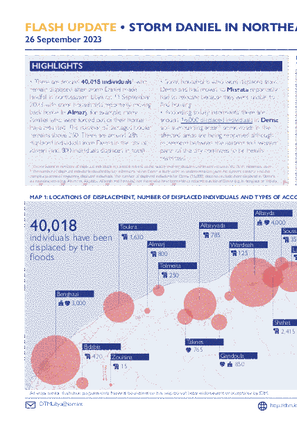
Contact
DTMLibya@iom.int
Language
English
Location
Libya
Snapshot Date
Sep 26 2023
Activity
- Other
There are around 40,018 individuals who remain displaced after storm Daniel made landfall in northeastern Libya on 11 September 2023 with some households reportedly moving back home. In Almarj, for example, many families who were forced out of their homes have returned. The number of damaged houses remains above 350. There are around 285 displaced individuals from Derna in the city of Almarj (and 800 individuals displaced in total).
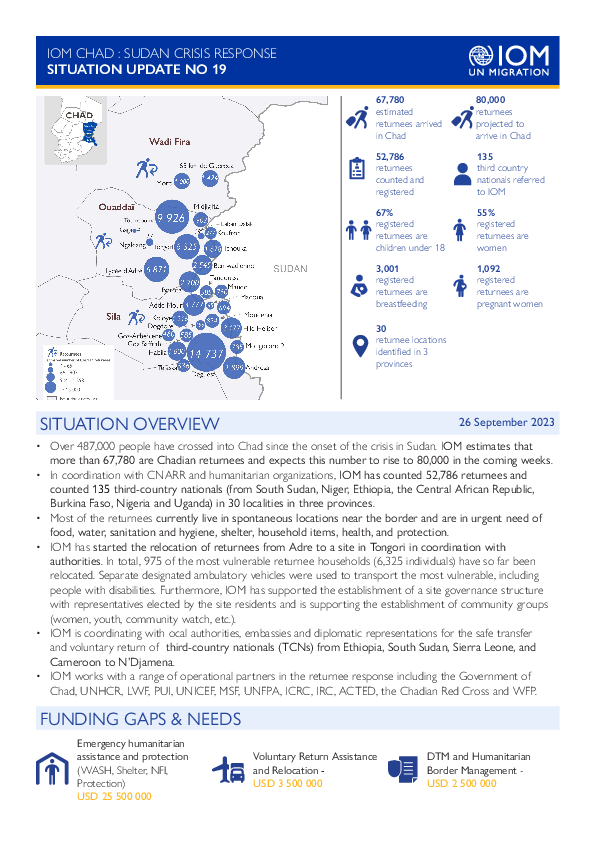
Contact
DTM Chad, dtmtchad@iom.int
Language
English
Location
Chad
Snapshot Date
Sep 26 2023
Activity
- Survey
- Flow Monitoring Survey
- Flow Monitoring
- Over 487,000 people have crossed into Chad since the onset of the crisis in Sudan. IOM estimates that more than 67,780 are Chadian returnees and expects this number to rise to 80,000 in the coming weeks.
- In coordination with CNARR and humanitarian organizations, IOM has counted 52,786 returnees and counted 135 third-country nationals (from South Sudan, Niger, Ethiopia, the Central African Republic, Burkina Faso, Nigeria and Uganda) in 30 localities in three provinces.
- Most of the returnees currently live in spontaneous locations near the border and are in urgent need of food, water, sanitation and hygiene, shelter, household items, health, and protection.
- IOM has started the relocation of returnees from Adre to a site in Tongori in coordination with authorities. In total, 975 of the most vulnerable returnee households (6,325 individuals) have so far been relocated. Separate designated ambulatory vehicles were used to transport the most vulnerable, including people with disabilities. Furthermore, IOM has supported the establishment of a site governance structure with representatives elected by the site residents and is supporting the establishment of community groups (women, youth, community watch, etc.).
- IOM is coordinating with ocal authorities, embassies and diplomatic representations for the safe transfer and voluntary return of third-country nationals (TCNs) from Ethiopia, South Sudan, Sierra Leone, and Cameroon to N’Djamena.
- IOM works with a range of operational partners in the returnee response including the Government of Chad, UNHCR, LWF, PUI, UNICEF, MSF, UNFPA, ICRC, IRC, ACTED, the Chadian Red Cross and WFP.
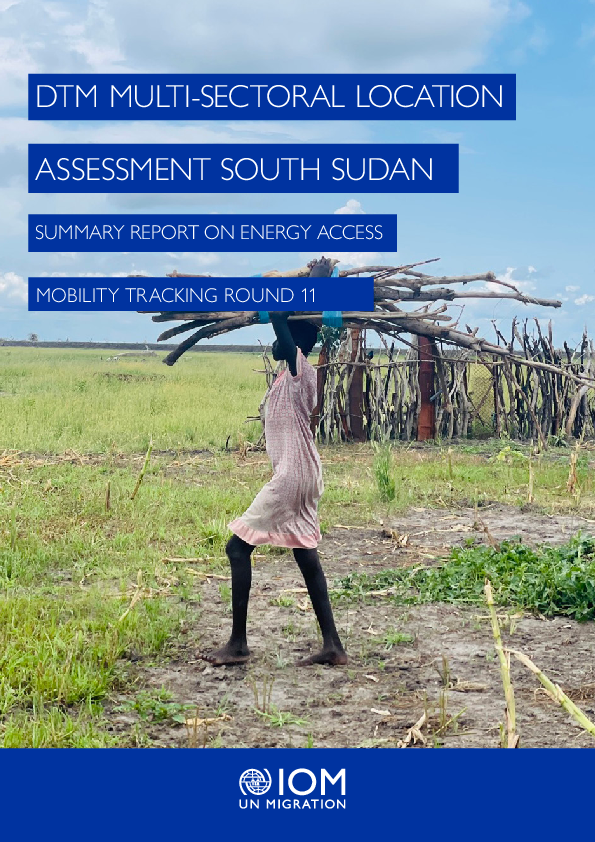
Contact
SouthSudanDTM@iom.int
Language
English
Location
South Sudan
Period Covered
Jul 01 2021
Sep 30 2021
Activity
- Mobility Tracking
- Site Assessment
- Baseline Assessment
- Village Assessment
This report presents a summary of the analysis of energy-related data based on the Mobility Tracking Round 11 of the DTM Multi-Sectoral Location Assessment (MLSA) in South Sudan. The assessment had the novelty of including energy access-related questions, following the structure of the newly introduced DTM Energy Module.
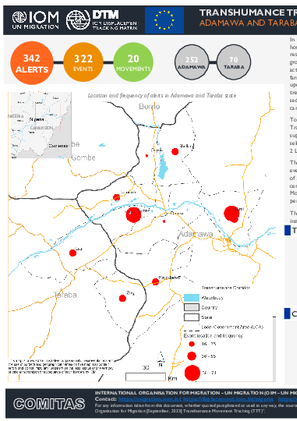
Contact
DTM Nigeria, AllUsersInDTMNigeria@iom.int
Language
English
Location
Nigeria
Period Covered
Aug 01 2023
Aug 31 2023
Activity
- Event Tracking
In northern Nigeria and other Sahel regions, the escalation of hostility and violent conflicts between transhumant herders and farmers are linked to several key factors. One of the main contributors is the competition over natural resources, which is exacerbated by the low rainfall, insecurity, insurgency, growing population and the attendant land-intensive demands for both farming and transhumance activities. Additionally, year-round farming and the conventional methods of land allocation to farming and herding activities add to the tensions, as farmers may encroach on designated grazing areas and routes, and herders in turn resort to destructive practices such as trespassing on farmlands, causing crop destruction and polluting water sources to feed their cattle. These factors sometimes result in deadly conflicts.
To understand, evaluate and mitigate conflicts between transhumant herders and sedentary farmers, the Transhumance Tracking Tools (TTT) as a component of IOM's Displacement Tracking Matrix (DTM), and supported by a network of community key informants, implemented the Early Warning System in nine selected Local Government Areas (LGAs) located in the neighbouring states of Adamawa and Taraba (7 and 2 LGAs of Adamawa and Taraba state respectively). The triangulated 342 alerts linked to farmer-transhumance events for August 2023 comprise of 322 (94%) events and 20 (6%) movement alerts. Of the reported alerts, the largest number, representing 23 per cent of all alerts are reported in Demsa LGA in Adamawa state followed by Zing LGA of Taraba at 16 per cent. The disaggregated event alerts in the two states show the highest reported events of 21 per cent for Monkin ward within Zing LGA in Taraba state, followed by Kola ward in Guyuk LGA of Adamawa at 20 per cent, while Nassarawo Demsa and Gwamba wards of Demsa LGA reported 15 per cent each.
The reported alerts suggested instances of 1 per cent population displacement and 21 per cent of instances that resulted in casualties or injuries.
